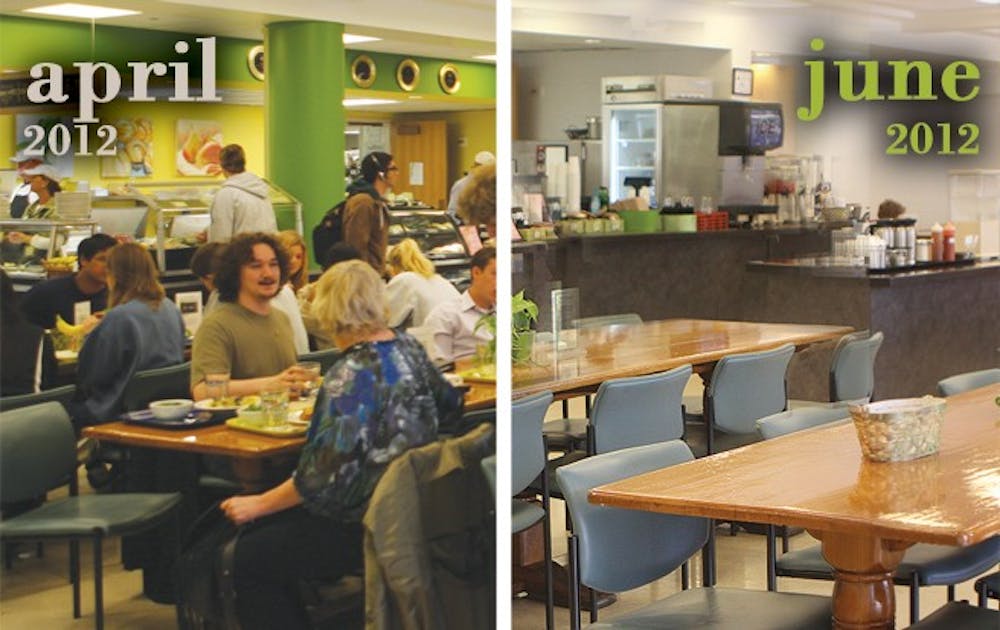Despite student protests on the Refectory’s behalf, Duke’s sustainable cafe is leaving its Divinity School location in July.
The eatery, which opened in 2005 and won numerous awards for serving the best food on campus, will move off campus to a new location on Chapel Hill Boulevard and will launch a food truck. The move comes after owner Laura Hall refused to pay a higher commission to Duke Dining. A yet-to-be-determined vendor will be selected by Duke Dining to occupy the Refectory’s Divinity School location.
“It’s a sad moment for Duke,” said former Duke Student Government president Pete Schork, Trinity ’12. “It’s obviously financially motivated, but the undergraduate community was overwhelmingly in support of the Refectory staying on campus, overwhelmingly in favor of incurring further fees in order to keep them on campus.”
Contract negotiations between Duke Dining and Hall stalled in the Spring after Hall declined to increase the annual commission she pays to Duke from 10 to 15 percent of gross revenue.
With the existing commission rate, the Refectory paid Dining Services $130,000 from June 2011 to June 2012, Hall said. The fee would rise by $65,000 if the Refectory’s revenue stayed the same next year. The vendor’s revenue has increased each year it has been on campus.
Ongoing debate
With a Facebook protest page, a student survey and a DSG resolution, the student body did all it could short of direct action to make its feelings known to dining officials, Schork said. He doubts that the sense of community undergraduates found at the Refectory can be replicated at another restaurant.
Andrew Schreiber, Trinity ’11 and former president of the Duke University Student Dining Advisory Committee, wrote in an email Monday that the lower commission rate may be justifiable based on the quality of the Refectory experience, noting that it was difficult to appraise the value of certain benefits that go beyond food, such as sustainability and a sense of community.
After surveying students, DSG passed a unanimous resolution that undergraduates would be willing to pay higher dining fees to keep the Refectory on West Campus.
But Johnson said the Refectory menu did not appeal to a broad range of Divinity School students, whose interests take priority since the restaurant was located in their school.
“That’s what we heard loud and clear in the Spring—Divinity School students wanted to broaden the menu and reduce the price,” he said.
But Hall said the Refectory has the most variety of any restaurant on campus.
“Go to Chik-Fil-A and tell me about their variety,” she said. “When you buy local food, you have nothing but variety because you’re seasonal. More stuff is always coming in. Every Sunday, a new menu comes out.”
Finding a replacement
Duke Dining and the Divinity School are committed to maintaining notable aspects of the Refectory, including sustainability, local products, healthy food and vegan and vegetarian options, Rick Johnson, assistant vice president for housing and dining, said.
A committee comprised of eight representatives from across campus, including dining officials, two students and several Divinity School stakeholders, is examining four proposals and will decide on a new occupant for the Refectory’s space.
Duke Dining invited Hall to submit a proposal, but Hall’s proposal did not include the requested 15 percent commission. She was not asked to give a presentation to the committee regarding the future of the Refectory space, as four other vendors did.
“When I wrote that proposal to Duke, I said, ‘If they don’t pick this, at least they know what they’re walking away from,’” Hall noted.
Hall’s 18-section proposal did not meet the minimum requirements, unlike the other four proposals, Johnson said. He declined to give details on what the minimum requirements for the proposal were.
Johnson also declined to provide details about the four other proposals or contract discussions, citing the confidential nature of the decision process.
The future of the Refectory
The current Refectory location has already been painted white to meet Hall’s contract obligation to return the space as she received it.
The Refectory’s location at the Law School, which opened in 2008, still has two years remaining on its contract and will remain open.
“I created an entirely new model for the restaurant industry,” Hall said. “And it has been voted the best food on campus for seven years.”
Hall noted that she has been approached by representatives from the University of North Carolina at Chapel Hill and students from Davidson College, who are interested in the possibility of bringing the Refectory to their campuses.
All of Hall’s employees will follow her to the new Refectory location, and she will hire more workers.
When Hall started the Refectory, she was told she would be lucky if she could bring 100 customers a day into the Divinity School location. This past Spring, the Refectory had more than a thousand customers for breakfast and lunch each day, Hall said.
The Refectory may also return to West Campus, if dining officials approve the Refectory’s Greatest Hits as an official campus food truck. Hall said she feels the commission structure for food trucks is fair, and she would pay the rate the University asks.
This article has been updated to include changes in the commission rate based on renewal of dining vendor contracts.
Get The Chronicle straight to your inbox
Signup for our weekly newsletter. Cancel at any time.

